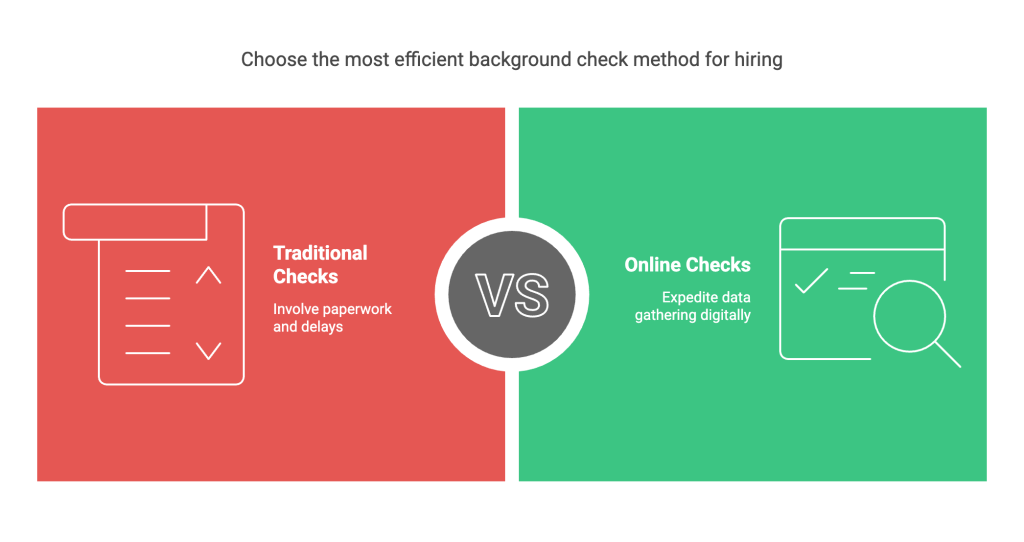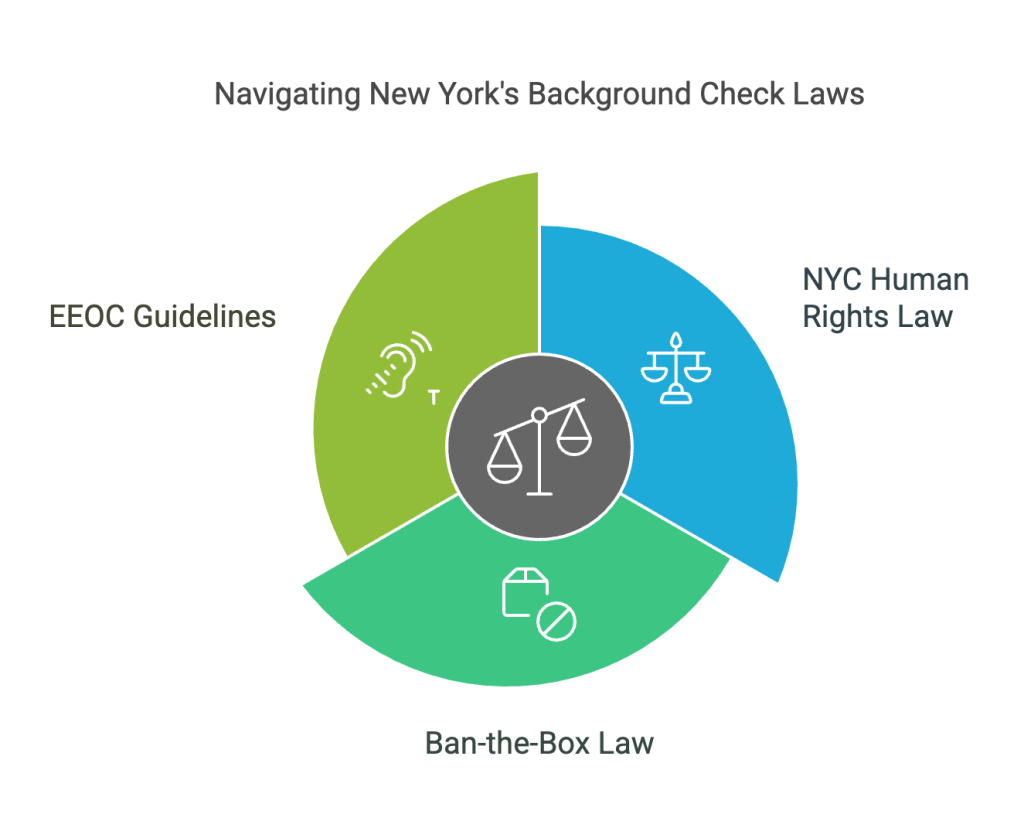Navigating the intricate world of online background checks in New York can feel like deciphering a complex code. As technology advances and the hiring landscape evolves, both employers and job seekers need to understand the nuances of these checks. This comprehensive guide will walk you through everything, from what online background checks entail and the legal landscape in New York to technological trends and practical tips for navigating this vital aspect of employment.
Key Takeaways
- Background checks in New York are influenced by specific state and city regulations that impact both employers and job seekers.
- Online background checks provide faster and more efficient ways for employers to gather necessary information compared to traditional methods.
- New York laws such as the New York City Human Rights Law and Ban-the-Box policy ensure fairness during the hiring process by setting clear guidelines on when and how employers can conduct background checks.
- Technology, including AI and machine learning, accelerates the background check process but requires careful oversight to ensure accuracy and data security.
- Despite legal safeguards, background checks can still perpetuate biases, highlighting the need for balance between ensuring workplace safety and offering fair employment opportunities.
Introduction
Background checks play an essential role in modern hiring. They help employers make informed decisions and maintain a safe workplace. In New York, the legal landscape surrounding these checks is unique, shaped by specific laws and cultural expectations.
The complexity stems from New York's blend of state and city regulations. Laws like the New York City Human Rights Law impose strict rules on how and when checks can occur. This makes understanding your role and rights crucial, whether you're an employer or job seeker.
In this guide, we'll explore these legal nuances, delve into the latest tech trends shaping how checks are conducted, and offer practical advice for navigating this crucial employment process.
What Are Online Background Checks?
Online background checks serve as a vital tool in the hiring process, providing employers with key information about potential employees. Unlike traditional background checks, which often involve cumbersome paperwork and lengthy wait times, online checks leverage digital resources to expedite information gathering. These modern methods facilitate quicker access to data, necessary for informed hiring decisions.

Typically, online background checks comprise several essential components. Criminal record searches uncover any legal issues in an applicant's past, helping assess potential risks. Credit history reviews offer insights into financial responsibility, although their relevance varies by job type. Driving records are crucial for positions involving transportation, ensuring candidates maintain safe driving habits. Lastly, education verification confirms the authenticity of academic credentials, preventing future complications from misrepresented qualifications.
In utilizing online background checks, employers must navigate a balance between thorough vetting and candidate privacy. Recognizing the distinctions between traditional and online methods can enhance your understanding and enable more strategic hiring practices.
The Legal Landscape in New York
Background checks in New York come with their own set of rules, shaped by distinctive state and local laws. One key piece of legislation is the New York City Human Rights Law, which plays a significant role in how these checks are conducted. This law ensures fair treatment for applicants, preventing bias based on background check findings. Let's look at what you need to know.
New York's Ban-the-Box law is another crucial element. It prohibits employers from asking about criminal history on job applications. This means you cannot ask about arrests or convictions until after a conditional offer is made. The idea is to give everyone a fair chance during the initial stages of the hiring process. It aims to reduce the stigma that might come with a past criminal record and focus first on qualifications.
Federal guidelines also apply, particularly those from the Equal Employment Opportunity Commission (EEOC), which emphasize non-discriminatory practices. Employers in New York must align their practices with these EEOC guidelines, ensuring background checks do not lead to unfair treatment of candidates from protected classes. This alignment requires a balance between thorough vetting and fair employment practices.

These legalities can be challenging to navigate, especially for employers who operate in multiple states. Each state has its own set of laws, but in New York, the focus is on fairness and opportunity for all candidates. Are your background check practices keeping pace with these regulations? Understanding and updating your procedures in line with state and federal laws can save you from potential legal pitfalls.
Technological Trends Influencing Background Checks
AI and machine learning are reshaping how background checks work. They help sift through large amounts of data quickly and accurately. By automating routine tasks, these technologies can flag potential issues faster than humans alone. For example, AI algorithms can rapidly analyze criminal records or verify educational credentials without taking breaks. But, like any tool, the accuracy of AI depends on the quality of data it's fed. Flawed input leads to flawed results, reminding us that these systems need oversight.
Data privacy and security have become urgent concerns. As background checks go digital, protecting applicants' personal information is critical. Employers must ensure data security to prevent breaches that could expose sensitive information. The rise in cyber threats makes this a priority. It’s not just about compliance with laws; it’s about maintaining trust in the hiring process.
Automation cuts down the time it takes to complete a background check. The entire process is more efficient, reducing the time candidates spend waiting for results. Fewer human errors translate into more reliable outcomes, but the human touch remains essential in evaluating complex cases. Automation should enhance human judgment, not replace it.
By integrating these technological advancements, background check processes can be more reliable and efficient. However, those using these tools must stay informed and vigilant about how technology shapes the hiring process. How do you ensure all this technology serves both companies and job seekers fairly and effectively?
Social Implications of Online Background Checks
Background checks can act as both a filter and a barrier in employment. For some, this process uncovers issues that might raise flags about reliability or trustworthiness. For others, it validates their claims and qualifications, paving the way for opportunity. In New York, background checks can limit access to jobs for those with past legal issues, contributing to ongoing cycles of employment insecurity. Notably, 67% of employers review criminal history during routine checks. This often leaves individuals with records at a disadvantage, unfairly overshadowing their skills and rehabilitative efforts.
New York has implemented laws like Ban-the-Box to delay when employers can ask about criminal records, aiming to reduce discrimination. But even with such measures, biases can persist. These checks may unintentionally encourage prejudices, sometimes perpetuating racial and social inequities despite legal safeguards.
Public perception of background checks often divides opinion. Some see them as necessary for safety and suitability, while others worry about privacy invasions. The debate surrounds how much personal history should impact someone's employment opportunities. It raises a question for you: Should a single part of a person’s past indefinitely limit their future? As technology evolves, so too does the conversations surrounding fairness, transparency, and the ethical use of personal data in hiring. Your perspective matters in shaping a balanced approach between security and opportunity.
Data-Driven Insights
Background checks play a key role in the hiring process, offering insights that shape decisions and ensure safe work environments. In recent years, their usage has been steady. According to a survey from the HR Research Institute, approximately 95% of organizations conduct some form of background check on potential hires. This high percentage underscores the reliance on these checks to minimize risks.
The numbers reveal the effectiveness of background checks too. According to a 2022 report by SHRM, businesses that implement thorough background checks see a 28% reduction in negligent hiring claims. This reduction reflects the value of these checks in identifying discrepancies and ensuring that candidates possess the qualifications they claim to have.
While the process can be rigorous, it highlights potential red flags that might not surface during interviews. For example, a thorough background check can uncover discrepancies in employment history or unexplained gaps—a crucial discovery given that 78% of resumes contain misleading information according to a 2023 CareerBuilder study.
Are background checks a flawless solution? Absolutely not. But they offer data-backed assurance that can make hiring smarter and safer. As an employer, how does this align with your approach to building a reliable team? Are you leveraging this tool to its fullest potential, or could you improve your strategy based on these insights?
Best Practices for Employers
Compliance is the bedrock of any background check process. In New York, navigating the legal framework requires staying up-to-date with both state and local laws. For instance, the New York City Human Rights Law imposes strict guidelines on how you can use background check information in hiring. Ignoring these can lead to hefty penalties and damaged reputation. Always consult with legal professionals to ensure your background check policies are compliant.
Transparency and clear communication with candidates can build trust and create a more efficient hiring process. Before starting a background check, inform candidates about what the check will involve and how it might affect their application. This openness shows respect and can make candidates feel more at ease. Provide them with an opportunity to explain discrepancies if they arise. A transparent process also includes obtaining the candidate's permission in writing, which is a legal requirement.
Ethical considerations should not be overlooked. Using personal data ethically means looking beyond the raw information and considering the context. Be aware of biases that can skew how background information is interpreted. Assess only relevant information that directly impacts the candidate's ability to perform the job. For instance, a minor, unrelated criminal offense years ago should not overshadow their current qualifications. Being mindful of these ethical aspects can help your organization make fairer, more informed hiring decisions.
Tips for Job Seekers
Preparing for a background check is essential. Start by verifying your own records. You can order your credit report, check public records, and call your past employers. Make sure everything aligns with what you have on your resume. This allows you to address discrepancies upfront rather than being caught off guard.
Knowing your rights is crucial, especially under New York law. Employers must inform you if they plan to run a background check. They should also provide you with a copy of the report if adverse actions are considered. Familiarize yourself with the New York City Human Rights Law and the Ban-the-Box law. These laws protect you, so understanding them gives you a leg up.
If you have a criminal record or other issues in your history, honesty is your best policy. Be upfront and prepared to discuss your past. Address concerns directly, focusing on what you have learned, how you've grown, and why those experiences make you a stronger candidate. This can turn potential negatives into positives in the eyes of an employer. Remember, transparency and a well-prepared narrative can make all the difference.
Conclusion
Online background checks in New York shape the hiring landscape significantly. We've explored how these checks work, touched on the legal requirements, and looked at technological influences. Employers should stay updated on legal compliance and respect candidate rights. Clear communication and ethical practices are crucial.
Looking ahead, expect changes as laws evolve and technology advances. The balance between thorough vetting and respect for privacy remains vital. As the situation develops, staying informed will help you navigate these changes effectively.
A balanced approach benefits everyone involved. Employers get the information needed to make informed decisions. Job seekers deserve transparency and fairness in the hiring process. Let's use background checks to support a more equitable employment landscape.
Additional Resources
For a deeper understanding of online background checks and related topics, explore the following resources:
- GCheck Blog: Visit GCheck blog for insights into the latest trends and best practices in conducting background checks. They're a great resource for both employers looking to improve their processes and job seekers who want to know what to expect.
- New York State Department of Labor: Their official website offers valuable details on employment laws and regulations applicable in New York. It’s an important stop for both employers and applicants to ensure compliance and awareness.
- Legal Assistance Sites: Websites like Nolo provide useful legal guidance on employment rights concerning background checks, including detailed articles and guides.
- National Consumer Law Center: Their reports and guidelines can be instrumental in understanding consumer rights as they pertain to background checks. They focus heavily on privacy issues and the protection of personal data.
- Equal Employment Opportunity Commission (EEOC): Refer to the EEOC's official resources for comprehensive details on fair hiring practices. They provide guidelines aimed at preventing discrimination in the workplace.
These resources offer valuable insights for navigating the complex landscape of background checks, ensuring you stay well-informed whether you're conducting them or undergoing one yourself.
Frequently Asked Questions (FAQs)
How to get a background check in New York?
To obtain a background check in New York, you can request one through the New York State Office of Court Administration (OCA). You will need to complete their designated application form and provide a fee. Results are typically mailed to you.
What is the best online background check website?
While there are several online services, sites like TruthFinder, Intelius, and Instant Checkmate are popular. Compare features, pricing, and user reviews to determine which suits your needs.
What is the background check policy in New York?
In New York, employers must follow specific guidelines under the Fair Chance Act. They cannot ask about an applicant’s criminal history until after a job offer is made. Any use of criminal records must be job-related.
How to look up criminal records in New York?
Access criminal records through the OCA’s Criminal History Record Search. Complete their form, pay the required fee, and receive information about convictions statewide.
How do I check if I have a warrant in New York?
Contact the New York State Division of Criminal Justice Services or your local police department. You may also inquire through county court records for public warrant information.
Can I dispute inaccurate information in my background check?
Yes, if you find errors in a background check, you can contact the reporting agency and dispute the inaccuracies. They are required to investigate your claims.
Are there free ways to conduct a personal background check?
You can start by searching public records, social media, and online databases. Some local court records may be available for free in person or online.
What details are included in a New York background check?
Typically, a background check includes criminal records, employment history, credit history, and education verification, depending on what is needed. Employers must have a legal basis for requesting such information.
How long does it take to receive a background check in New York?
Processing time varies but generally takes a few days to a few weeks. Factors include the source of the check and the depth of information requested.

GCheck Editorial Team
Meet the GCheck Editorial Team, your trusted source for insightful and up-to-date information in the world of employment background checks. Committed to delivering the latest trends, best practices, and industry insights, our team is dedicated to keeping you informed.
With a passion for ensuring accuracy, compliance, and efficiency in background screening, we are your go-to experts in the field. Stay tuned for our comprehensive articles, guides, and analysis, designed to empower businesses and individuals with the knowledge they need to make informed decisions.
At GCheck, we're here to guide you through the complexities of background checks, every step of the way.





